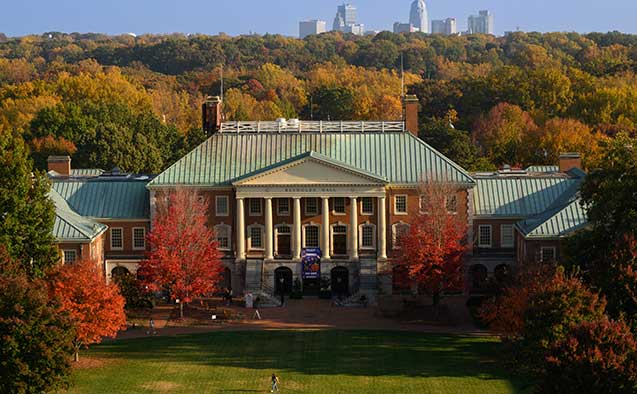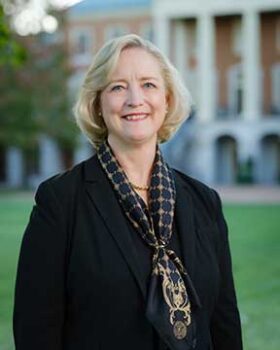Mellon Foundation awards WFU $1M for environmental justice project

The Mellon Foundation has awarded a $1 million grant to Wake Forest University to create a model program for engaging scholars and the local community in advancing environmental justice.

Corey D.B. Walker
“This is an opportunity to develop a cross-institutional program that leverages the strength of our liberal arts tradition and models new ways to engage the humanities and sciences to address the pressing challenges facing our society and world,” said Corey D. B. Walker, Wake Forest Professor of Humanities who will lead the project. Walker is also director of the African American Studies Program and interim dean of the School of Divinity.
He said the January 2022 Weaver fertilizer plant fire in Winston-Salem exposed the historic and ongoing legacies of race, racism and environmental injustice in the local community and both shaped and gave urgency to the work the grant will fund.
“In many ways, Weaver served as a wake-up call to initiate, support and sustain a model intellectual community built on the principles of collaboration, creativity and commitment to our deepest values,” Walker said.
“I want us to create something together. We have a responsibility to do this important work.” Professor of Humanities Corey D.B. Walker

Susan R. Wente
Starting with a collaboration between Wake Forest’s African American Studies program and Environmental Studies program, the scope of the work will extend to departments across campus and into the community.
“This project reflects the best that Wake Forest offers in interdisciplinary, radically collaborative, community-centric, humanistic inquiry,” said Wake Forest University President Susan R. Wente. “We are grateful for the support from the Mellon Foundation to engage in this important work.”
The three-year, multi-pronged effort – called “Environmental and Epistemic Justice: A Transformative Humanistic Model for Science and Technology Studies” – will help the University imagine, design and develop a humanistic Science and Technology Studies curriculum that places environmental justice at the center. It will build on the STEM-focused programs in the local community supported by earlier Mellon grants.

Michele Gillespie
“Approaching research, teaching and environmental justice with a humanities lens means we can unleash collaborative critical thinking to find unique solutions to our world’s most challenging problems,” said Provost Michele Gillespie. “Our Winston-Salem community is home to universities and community-based organizations and networks that can partner with Wake Forest in this effort.”
“We look forward to blending academic and local knowledge in ways that will resonate across higher education.” Provost Michele Gillespie
How $1M will make a difference
The new grant will fund a variety of seminars, institutes and public educational forums for citizens, environmental justice advocates, journalists, and public officials, including:
- The Wake Forest Environmental Justice Forum will offer four to five public educational programs for citizens, environmental justice advocates, journalists and local officials engage in conversations and debates.
- A Faculty Fellows program for eight faculty members per academic year to create and sustain a faculty learning community to share research and teaching on new knowledge born out of the intersection of African American Studies and Environmental Studies.
- A Community Environmental Justice Fellows program from community partner organizations to learn from and contribute to teaching and research. Fellows will focus on a specific issue or topic related to race, racialization and the environment that will link classroom, campus and the community.
- An Environmental Justice Research Seminar to serve as a collaborative learning community to critically examine, address and engage fresh perspectives on race, racialization and the environment.
- The Science, Justice and Society Summer Institute for faculty from Wake Forest, Winston-Salem State and Salem College as well as invited scholars, activists and public officials.
The grant will also support paid research opportunities for undergraduate students and two new full-time positions: a project coordinator and a postdoctoral fellow.
Professor Julie Velasquèz Runk, named Wake Forest’s director of the undergraduate Environmental program and Weigl Fellow earlier this year, will be one of the key collaborators on this project.

Julie Velasquèz Runk
“I am excited about this collaboration with African American Studies and Environmental Studies and the opportunities it provides for the practice of inclusive environmental problem-solving,” Runk said.
Walker highlighted how he envisions the project moving forward: “This effort will require a deep intellectual humility and hospitality. It will be animated by our collective curiosity about teaching and learning in new ways, with new collaborators – both inside and outside of the University, and with a creativity born out of passion to embody our motto Pro Humanitate.”
Building on past support
This project builds on and sustains the work funded by a 2018 $850,000 Mellon Foundation grant. The four-year grant supported “The Humanities Engaged” and expanded the University’s humanities-based programming in the community with seminars, oral history projects, research and community conversations. Wake Forest hosted a national conference on “The University and the Neighborhood” in November.
In 2015, Wake Forest received a $650,000 Mellon grant to expand its interdisciplinary humanities research, teaching practices, and public scholarship. The three-year grant funded, among other things, the creation of a digital humanities design studio in Z. Smith Reynolds Library.
Categories: University Announcements
Wake Forest News
336.758.5237
media@wfu.edu
Meet the News Team
Headlines
Wake Forest in the News
Wake Forest regularly appears in media outlets around the world.




